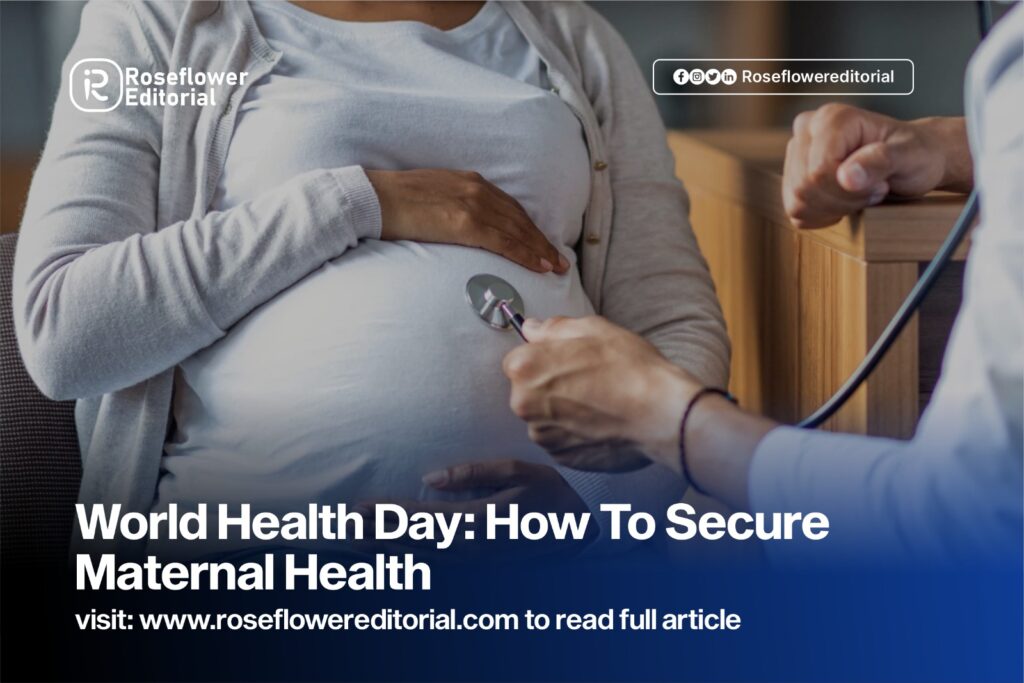
When Mothers Suffer, Nations Bleed
Maternal health should be a global priority. But every two minutes, a woman dies during childbirth. Most of these deaths are preventable. Yet behind every number lies a grieving family, a child left without a mother, and a future slowly falling apart. That is why maternal health is so important. It goes beyond hospitals and medicine. It lays the foundation for strong families, stable communities, and a hopeful future. This World Health Day 2025, the message could not be clearer. When we protect maternal health, we protect generations. When mothers live, families stand stronger. But when they are lost, the ripple effect is deep. Communities feel the pain, economies take the hit, and children grow up without the care they deserve. In the end, choosing to protect maternal health is choosing to protect our shared future.
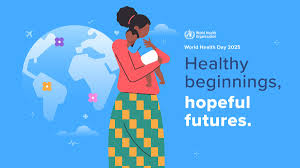
Why Maternal Health Is a Global Emergency
Every year, over 287,000 women lose their lives during childbirth, and tragically, Nigeria is one of the countries most affected. Across Africa, maternal mortality rates remain shockingly high, with most deaths being entirely preventable.According to the World Health Organization (WHO), this crisis is part of the Sustainable Development Goals. Yet, it continues to devastate families and communities. The impact is deeply personal. Each loss leaves behind broken homes, traumatised children, and fathers who are forced to carry unbearable grief. As the saying goes, “The death of one mother is the death of a generation.” When a mother dies, the consequences echo across entire communities. It is a tragedy that reaches far beyond one life. It affects the future of her children, her family, and her nation.

The Price of Neglect — What We Lose When We Fail Mothers
When my immediate elder sister passed away during childbirth, it devastated our family. She had been diagnosed with ectopic pregnancy years before and was advised to wait a few years before trying to conceive again. However, just a year after her operation, she became pregnant. Her pregnancy was complicated from the second trimester. Despite a caesarean section, her stomach swelled, and within days, she passed away. This loss was not just personal; it destroyed a future. Her children were left without a mother. My family struggled to cope with the grief. Unfortunately, this tragedy is not isolated. When maternal health is neglected, the effects are far-reaching. Children lose their mothers, and they face educational setbacks, poverty, and hindered development. The consequences ripple through families and communities. Often, the true victims are invisible—the unborn children who never get to be raised by their mothers, and the siblings who grow up without them. Myth: Only poor women die in childbirth. Reality: Lack of access to proper care affects women across all income levels. Failing to protect maternal health means losing more than just mothers. It means losing the foundation of families and the potential of entire generations.
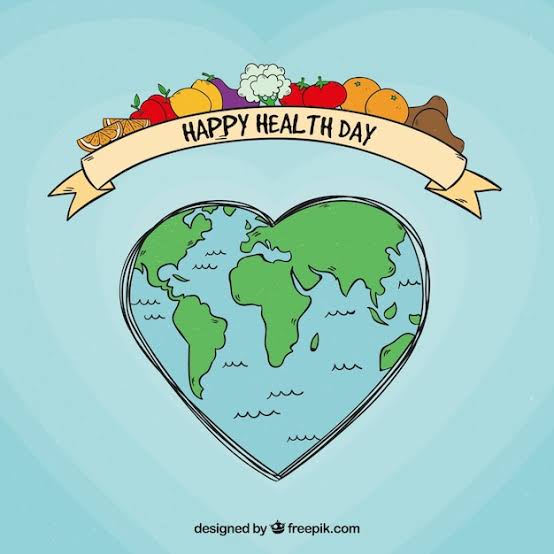
Barriers to Maternal Health — What’s Standing in the Way?
Maternal health faces significant barriers in many parts of the world. In some Nigerian states, rural healthcare centres are severely underfunded, leading to high rates of preventable maternal deaths. According to the World Health Organisation, approximately 800 women die every day from complications during pregnancy and childbirth worldwide, and Nigeria accounts for about 20% of these deaths. This crisis is worsened by a shortage of skilled birth attendants in rural areas, leaving mothers at high risk during labour. In Sub-Saharan Africa, where healthcare syste are often overwhelmed, one in every 37 women dies during pregnancy or childbirth—a statistic dramatically higher than the global average. Cultural silence about women’s pain, fear of judgement, stigma, and harmful myths about childbirth further isolate women from the proper care they need. As Dr Amina Abubakar notes, “The inequality in maternal health goes beyond healthcare; it is rooted in deep cultural and social barriers.” In Nigeria, data from the Nigeria Demographic and Health Survey and other studies show that many northern states suffer the most, with Zamfara State often recording one of the highest maternal mortality ratios. Factors such as limited healthcare facilities, socio-economic challenges, and entrenched cultural practices contribute significantly to these high rates. How much longer can we ignore the lives of mothers before it’s too late?
Faith, Culture, and the Fight for Mothers’ Lives
In many Nigerian communities, faith and tradition hold deep influence over maternal choices. Sometimes, they save lives. Other times, they silence the cries for help. Here’s how culture helps—and where it harms:
Where Faith and Culture Support Mothers:
In Kaduna State, some churches now provide free antenatal clinics and maternal counselling, helping women get early support.
In Kano, mosques have partnered with local NGOs like the Kano Maternal Health Initiative to offer maternal health talks and connect women to clinics.
In Cross River, the Community Health and Development Programme runs mobile clinics to reach women in hard-to-access villages.
In Lagos, faith groups collaborate with Safe Motherhood groups to train birth companions and support emergency transport.
Where Tradition Puts Mothers at Risk:
In parts of Ebonyi State, many women still rely on traditional birth attendants due to cultural preference over medical care.
In Niger State, some women turn to herbal remedies during pregnancy, which may worsen complications.
In Benue, cultural silence means women hide their pain, fearing shame or spiritual judgement if they speak up.
In rural Zamfara, superstitions around childbirth delay urgent medical interventions, risking both mother and baby.
Examples of Cultural Reform in Action:
The Ogun State Health Insurance Scheme has made hospital births more affordable, helping families choose safer options.
Lagos State’s Emergency Obstetric Care (EOC) programme ensures trained health workers and quick transport for at-risk mothers.
In Rwanda, a community midwife training model has led to fewer maternal deaths. Nigeria is now studying this model to replicate its success.
We must not let beliefs bury our mothers. Instead, we must build a future where faith uplifts, culture protects, and every woman survives childbirth.
Securing Maternal Health — What Must Be Done Now
Maternal health is not a luxury; it’s a fundamental right. Every mother deserves the best chance at life, yet too many still face preventable risks. To secure a healthier future, we must act now. Here’s how we can make a difference:
Train and deploy more midwives and community health workers: Skilled professionals are essential, especially in rural areas, to save lives and provide quality care.
Ensure emergency transport and facilities: Timely access to emergency care is critical. No woman should be left without the help she needs when complications arise.
Policy reforms and increased funding: Strengthening policies and investing in maternal healthcare services will make long-term solutions sustainable and accessible to all mothers.
Educate mothers before, during, and after pregnancy: Educating women on prenatal care, delivery, and postpartum care reduces risks and improves outcomes for both mother and child.
“Safe motherhood is a human right”: Every mother deserves the chance to survive childbirth. It’s time to prioritise maternal health and make safe motherhood a reality for every woman.
Ultimately, the future of every nation depends on the health and well-being of its mothers. It’s time to act before more lives are needlessly lost. We must ensure that no woman faces childbirth without the support she deserves. The time for change is now.
The Role of Men, Families, and Communities
Imagine a world where every mother lives to see her children grow. A world where the life of each mother is celebrated, protected, and nurtured. “Every heartbeat she carries is a future unfolding,” for in every mother lies the potential to shape generations. As Buchi Emecheta wrote in The Joys of Motherhood, “A woman is only respected as a mother. Not as a person.” We must change this. Motherhood is joy—found in lullabies, first steps, and whispered prayers at dawn. But it should never cost a woman her life. Across the globe, countries like Norway and Rwanda are making progress, reducing maternal deaths and strengthening care. We can do the same. Join us. Let’s pledge to fight for a future worth living—one healthy mother at a time.
This World Health Day, Be Her Voice
Take a stand for safe motherhood. Download our pledge, “I stand for safe motherhood.” Access our checklist, “10 Ways to Support Maternal Health in Your Community,” to learn practical steps. Please donate, share, and educate your community. When you save a mother, you secure the future.
Thank you for reading our article and do not forget to subscribe to our website at www.roseflowereditorial.com to get the latest updates and follow us on Instagram, Facebook, and LinkedIn.
In case you missed our previous article, kindly click here.
Article written and edited by Patience Ubi Featured Graphic Designed by Seye Somefun Patienceubionen
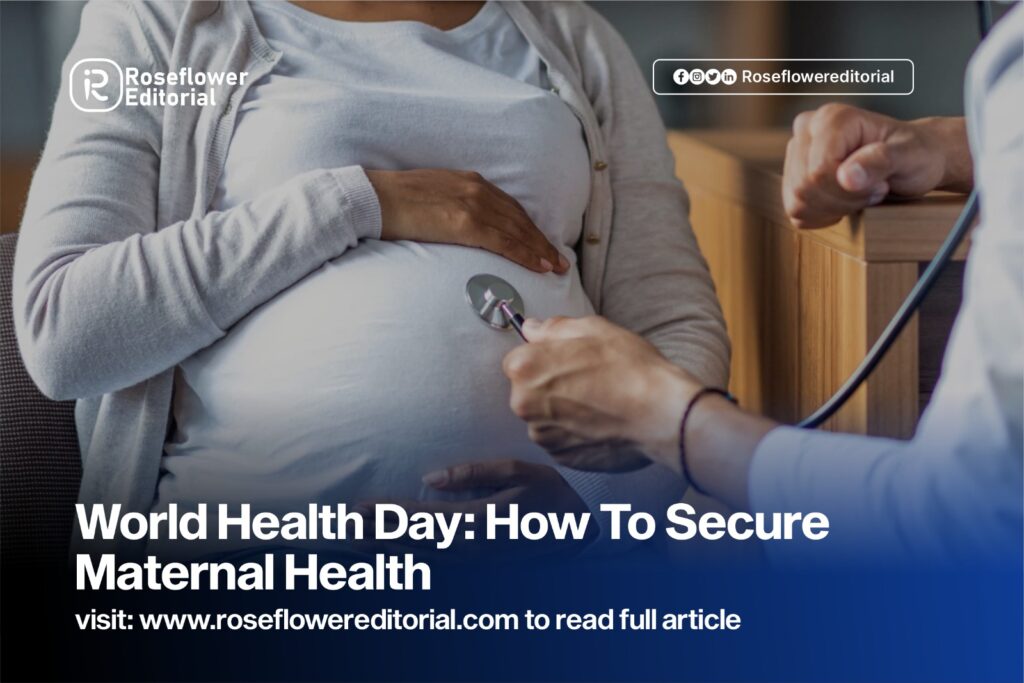
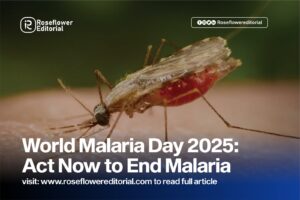











2 Responses
Patience, you piqued my interest here: ” A woman is only respected as a mother. Not as a person.” We must change this.
A community midwife training model in Rwanda has led to fewer maternal deaths. Nigeria is now studying this model to replicate its success. I hope this become successful.